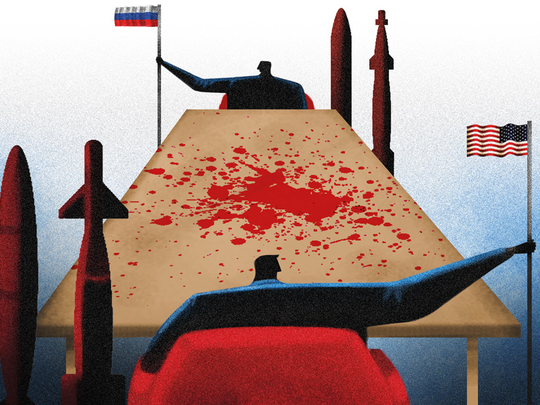
President Donald Trump’s decision to strike a Syrian airbase has propelled him from zero to hero in the eyes of most US allies. Formerly critical American media networks have adopted a more reverent tone, a patriotic switch that is invariably pulled whenever the US engages in military conflict abroad. Syrian opposition politicians and rebels glimpse a new dawn thanks to the man some have affectionately dubbed Abu Ivanka Al Amriki set to lend his name to Syrian newborns. Next, teenage boys will head to barber shops hoping for Trump’s glam hairstyle — or maybe not.
The UK and France have invigorated their mantra ‘Al Assad must go’. Turkey is once again pushing hard for ‘no fly zones’ and ‘safe zones’ to protect civilians. Israel’s Prime Minister Benjamin Netanyahu, bent on annexing the Golan Heights, can hardly contain his excitement.
As CNN anchors never cease to remind us, the international community’s new sheriff seemed indifferent to the suffering of Syrian babies in the aftermath of the 2013 devastating chemical attack on Ghouta.
“We should stay the hell out of Syria. The ‘rebels’ are just as bad as the current regime. What will we get for our lives and $ billions? Zero,” he tweeted then.
Is the influence of his devout Christian Vice-President Mike Pence behind his renewed spirit of compassion?
Hawkish politicians who accused President Barack Obama of leading from behind celebrate their country’s re-entry into the geopolitical game and are salivating for further anti-regime action. Some of his fiercest critics in Congress now see President Trump in a rosier light than candidate Trump. But hold your horses!
Senator Paul Rand has dismissed the military action as an unconstitutional rush to war without Congressional approval. Representative Tulsi Gabbard rehashed America’s blunders in Afghanistan, Iraq and Libya while accusing the administration of acting “recklessly”.
Other lawmakers are reserving judgement until such time as there is clarity on an overall Syria strategy. Does the administration even have a strategy? If a viable end game isn’t formulated fast, Trump’s newfound pedestal will implode.
Should he choose to be involved in Syria meaningfully, he will own it and won’t be at liberty to walk away when faced with unforeseen ramifications without losing the fledging trust of America’s friends and dashing renewed Syrian hopes.
A dose of reality is required. The administration has signalled the punitive strike could well be a one-off depending on Syria’s reaction. If that’s the case, it’s akin to an isolated pinprick. The runways are virtually undamaged. Al Assad will certainly think twice about using chemical weapons in the future, but far more civilians have died from barrel bombs than gas and the slaughter will continue unabated.
Trump may be mercurial, but his unwavering focus has always been on eradicating terrorists. He says his opinion on Al Assad has changed, but it’s incontrovertible that weakening the regime will create a vacuum for Daesh (the self-proclaimed Islamic State of Iraq and the Levant) to fill. Just one day after the US fired its Tomahawks, Daesh launched an offensive on a military base in the governorate of Homs.
Muting allegations
Trump has made a deafening shout-out that America’s capacity to project power is back up to speed and he may have provided the opposition with greater leverage during peace talks. Simultaneously, he has muted allegations that his campaign officials were in bed with Moscow.
US-Russian relations, however, are in a critical state. Trump’s vision of becoming pals with Vladimir Putin has evaporated. The Pentagon is investigating Moscow’s possible complicity in the chemical attack, a move guaranteed to raise Russian hackles.
Russia and Syria adamantly assert that Syrian warplanes were not equipped with chemical weapons but rather struck a rebel factory where such banned weapons were stored. Most countries treat that line with a heavy dose of scepticism. Conducting an independent ground investigation in the afflicted town of Khan Shaikhoun — a war zone where Daesh and an Al Qaida affiliate hold sway — is unfeasible. Moscow is flexing its muscles; it has vowed to beef up Syria’s air defences and has suspended an airspace deconfliction communication channel with the US.
A Russian warship armed with cruise missiles is heading to Moscow’s naval base at Tartus. Prime Minister Dmitry Medvedev warned that America’s action spelt “good news for terrorists” and brings the two nations closer to “a military clash”. Much depends on the upcoming meeting between Russia’s Foreign Minister Sergei Lavrov and his boss’s former friend, US Secretary-of-State Rex Tillerson in Moscow. Russia may have forfeited its monopoly over Syria’s fortunes, but I suspect both sides are willing to make compromises.
An adversarial relationship will ultimately prolong the Syrian people’s misery, produce more waves of refugees and in the worst case scenario could erupt into a full-scale war. A determined joint thrust towards a political solution could spur this bloody chapter to its final close, which is exactly what all exhausted parties to this conflict now crave.
Linda S. Heard is an award-winning British political columnist and guest television commentator with a focus on the Middle East.










